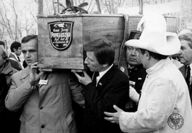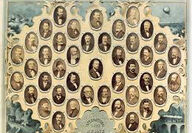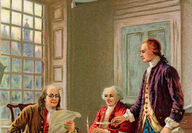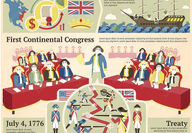Sorted by date Results 26 - 50 of 79

For a communist country, it was strange to have an unsanctioned gathering of a million people, but 40 years ago in Poland, the funeral of a simple parish priest brought the nation to a halt to pay their last respects. Father Jerzy Popiełuszko was not known as a great scholar or a powerful intellectual. In fact, he barely made the grades to graduate from seminary, but Popiełuszko was a man of the people, and he spoke to them in unadorned, persuasive sermons, chiseling a significant crack in P...

Communication has always been critical to international growth, development and understanding, but we take the ability of people to communicate for granted as most everyone has immediate access to phones, email, and text messaging. While instant communication is new, not too long ago, the main source of communication was the written word, transmitted primarily by letters. As each country developed, the need to communicate increased exponentially. Private couriers worked great for the...

I’ve never understood why Donald Trump seems to attract such a level of hatred and vitriol. There is nothing unusual about political candidates being vilified by opponents, but after an election or a term in office, the level of animosity usually subsides, and attacks focus on policy decisions and not as much on personality. I experienced some hostilities when I was a Republican presidential elector in 2016. It was my 4th time to be an elector from Alabama, so it was out of the ordinary when a...

An Englishman named Joseph Priestley made a discovery 250 years ago that marked the beginning of modern chemistry and continues to have important ramifications today. His remarkable find was, in a word: Unlike inventions, which create something new, discoveries acknowledge something that already exists and quantify it to explain its significance. Of course, oxygen has always existed, and its utility to human life is completely independent of the need for explanation. We know exactly what it is,...

"Experience must be our only guide. Reason might mislead us." So said John Dickinson at the Constitutional Convention in 1787, some 237 years ago this month. As we celebrate the birth of the United States Constitution, Dickinson's admonition is critical to understanding our Founding Fathers' thoughts that served as the basis for our constitutional government. Our Constitution, revered my many, detested by some and imitated worldwide, has stood the test of time. Even with disputes about its...

Inspired by the Protestant Reformation and Martin Luther’s confrontation with church hierarchy, peasants staged an insurrection which challenged the socioeconomic order. This revolt would have a lasting impact on Europe and set the stage for future conflicts between the elite aristocracy and the growing middle class. In 1524, the strata of society was organized according to land: its ownership, its use and ultimately, its profitability. The various plagues that decimated Europe in the past c...

I’ve never understood why Donald Trump seems to attract such a level of hatred and vitriol. There is nothing unusual about political candidates being vilified by opponents, but after an election or a term in office, the level of animosity usually subsides, and attacks focus on policy decisions and not as much on personality. I experienced some hostilities when I was a Republican presidential elector in 2016. It was my 4th time to be an elector from Alabama, so it was out of the ordinary when a...

Five hundred years ago, peasants in Central Europe revolted against their overlords. Inspired by the Protestant Reformation and Martin Luther’s confrontation with church hierarchy, peasants staged an insurrection which challenged the socio-economic order. This revolt would have a lasting impact on Europe and set the stage for future conflicts between the elite aristocracy and the growing middle class. In 1524, the strata of society was organized according to land: its ownership, its use and u...

One Hundred years ago, Congress passed, and President Calvin Coolidge signed a new immigration bill. While relatively uncontroversial in the United States - it had passed the Senate 69-9 and 308-62 in the House - the Act had a global impact. Its genesis was a study completed by the Dillingham Commission, which was formed by President Theodore Roosevelt and tasked with studying and identifying which immigrants would contribute most to the social fabric of America. The commission unfortunately...

Bloodless revolutions are the exception, not the norm. Indeed, history is replete with wars pitting various national or regional groups against one another for territory or other economic benefit. Survival of the fittest was not a theory but was a present reality for most of the history of the world, and the slogan “might makes right” was the equivalent of the rule of law in many places. Merge these ideas with the concept of the divine right of kings, and you have a formula for arbitrary gov...

Fifty years ago, Americans were so distracted by Watergate that they failed to notice the unmasking of one of the most consequential spies during the Cold War. Even today, few will remember the name Günter Guillaume; but most will remember a spy precipitating the fall of the West German Chancellor, Willy Brandt. While it is hard to quantify exactly what state secrets Guillaume disclosed to his East German handlers, it is even more difficult to connect his espionage with any specific action...

One Hundred years ago, Congress passed, and President Calvin Coolidge signed a new immigration bill. While relatively uncontroversial in the United States - it had passed the Senate 69-9 and 308-62 in the House - the Act had a global impact. Its genesis was a study completed by the Dillingham Commission, which was formed by President Theodore Roosevelt and tasked with studying and identifying which immigrants would contribute most to the social fabric of America. The commission unfortunately...

Four hundred years ago, King James I of England convened his last parliament, the most significant and enduring legacy of which was the “Statute of Monopolies.” This act was both a restriction on royal prerogative and the beginning of legal protection for patents and intellectual property. Prior to this act, the crown arbitrarily granted monopolies to bestow royal favor and also to receive a fee for the privilege. The grant of monopolies had become an end-run around parliament to indirectly rai...

On March 5, 1774 - 250 years ago this month - John Hancock cemented his legacy as a leader of colonial resistance to British rule when he delivered his “Boston Massacre Oration” on the fourth anniversary of the murder of civilian colonists by British troops. The tragic event was a touchstone of resistance to royal subjugation of the American colonies. While it was one thing to have British troops protecting the colonists and fending off the territorial ambitions of the French, stationing tro...

One hundred years ago, Vladimir Lenin died. Lenin was an unlikely revolutionary. His story was not one of meager beginnings or social depravation. Rather, he came from a family of means that had little connection with the proletariat he came to champion. He was well educated, attended college, and became a lawyer. But, during his “education,” he was radicalized when exposed to Marxism and embraced its view of 19th century revisionist history. Throwing facts aside, the history lessons he acc...

When James Monroe addressed Congress 200 years ago, many assumed his annual message would be limited to legislative initiatives. Since he had no spin doctors to help him explain his position, clarify its broad impact, or narrate its context, it was left to him to simply announce the Monroe Doctrine and let others decide its ramifications. Two centuries ago, the New World was shedding Old World political connections as new nation states were emerging after achieving independence. President...

When James Monroe addressed Congress 200 years ago, many assumed his annual message would be limited to legislative initiatives. Since he had no spin doctors to help him explain his position, clarify its broad impact, or narrate its context, it was left to him to simply announce the Monroe Doctrine and let others decide its ramifications. Two centuries ago, the New World was shedding Old World political connections as new nation states were emerging after achieving independence. President...

This month, Turkey will celebrate the 100th anniversary of its national Republic Day, which recognizes its transformation from a theocracy to an elected, representative democracy. And, while the contours of Turkey have been around as part of any number of empires, it has only been in recent memory that the nation turned from only facing Mecca and began to look West to the political systems more representative of Europe and Western civilization. Achieving this republic was not an easy task, but...

Imagine a country in the 20th century that in a matter of 30 years went from a per capita income of $500 to one of $50,000. Imagine further that the country had no natural resources and was roughly 150 times smaller than Alabama. And what would we think about a leader who achieved such spectacular results? Meet Lee Kuan Yew, who, had he lived, would be 100 years old this month. From 1959 to 1990 he served as prime minister of Singapore and was largely responsible bringing a third world country i...

One Hundred years ago, President Warren Harding died unexpectedly. Occupying the White House for a little more than two-and-a-half years, he was a popular president having been elected with the largest margin of victory of any presidential candidate before or since. Following his death, several scandals, both public and private, tarnished his reputation and obscured several significant accomplishments. Though he had been involved in Ohio state politics, the highest state office Harding ever...

To coincide with Independence Day, many foreign nationals will publicly renounce all loyalties to their country of origin, pledge their allegiance to the United States, and officially become U.S. citizens. Witnessing people from all walks of life and from every continent become citizens creates an infectious patriotism and offers a rare glimpse into the sacrifice others make to become an Americans. In evaluating other countries, Ronald Reagan said that the acid test of a nation's liberty and...

Adam Smith, the anchor of that group of inquisitive Scotsmen who spawned the Scottish Enlightenment and significantly changed the world, was born 300 years ago this month. The era of his birth was still primarily agrarian with superstition superseding science. He would alter this status by observing his community, pursuing the life of a scholar, and questioning his experiences in the world around him. And...... he wrote his thoughts down. Scotland was ready to nurture the likes of Smith. With...

Two hundred and fifty years ago, the British Parliament stumbled into what can only be described as a textbook case of how to alienate friends and lose loyal subjects. When the Tea Act was passed in 1773, British conventional wisdom was that decreasing the tax on tea would be well received. And even though the science of economics had not fully developed, reducing the cost of a household staple would arguably increase consumption to the applause of merchants and consumers. Little could anyone...

Trading in commodities, which are ingredients or components of finished goods, is the focus of global commerce. Information about commodities, their availability, and the impact of events that create scarcity, affects both current and future prices. Two hundred years ago, one significant commodity was tallow, a substance rendered from animal fat that was used to make candles, served as a basis for early skin care ointments, and was an essential ingredient of soap. Today, when we think about...

The desire for freedom and liberty is universal, but achieving it can take the effort of a lifetime. On March 15, 1848 - 175 years ago - Hungary revolted against the constraints imposed by both its Austrian masters and the authoritarianism of its ruling class. As a former Warsaw Pact country, little is known about the history of democratic institutions in Hungary. And it would be easy to conclude that the country’s experience with self-determination and independent government is recent. To the c...